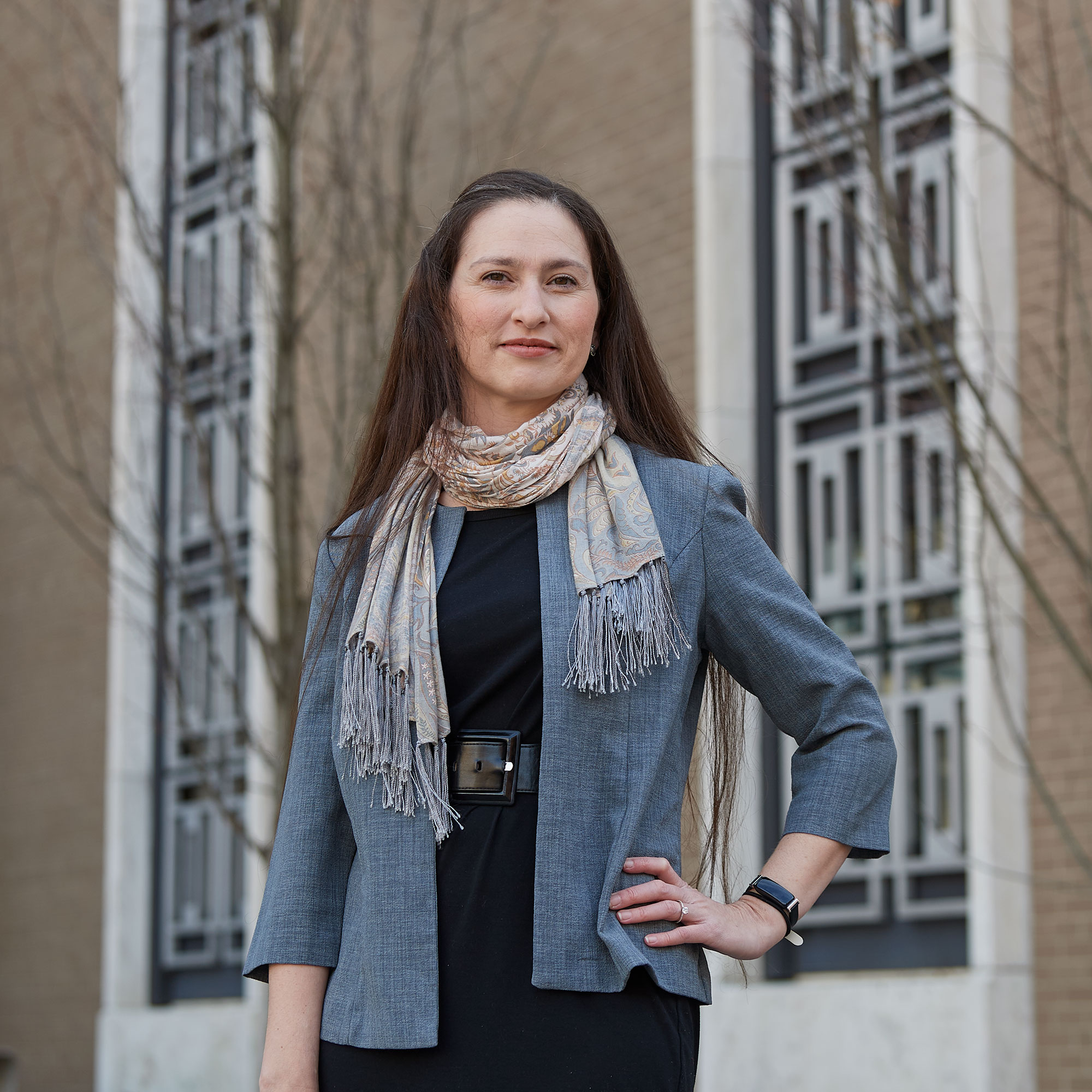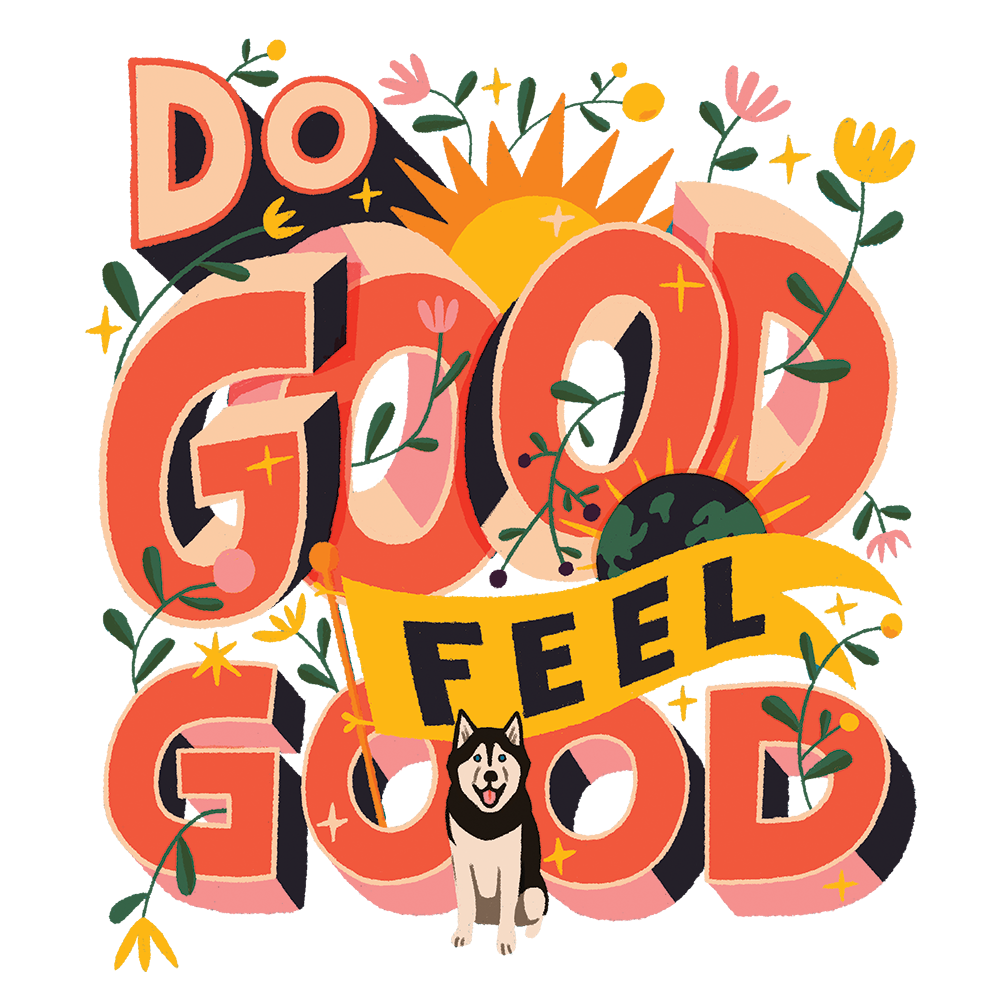| Do Good, Feel Good |

Humanizing Human Rights
By Jaclyn Severance
Photo by Peter Morenus
Don't look for Ellen Messali '10 JD on Monday nights.
You won't find her in her car, where she's typically making good use of her hands-free function to knock off phone calls during her 45-minute commute.
You won't find her running, even though she's invested in a home treadmill since the coronavirus pandemic has kept her away from the gym where she was once training for a 10K.
You won't find her binging on podcasts, though she's become an avid listener since this proud former "technology rejecter" finally caved and got her first smartphone in 2019.
You also won't find her at her desk at New Haven Legal Assistance, though on many other nights she's probably there, working well into the evening preparing briefs or evidentiary records or making other arrangements for her clients, many of whom are in detention facilities outside of Connecticut and all of whom are refugees and immigrants fleeing circumstances beyond their control.
Instead, on Monday nights, Ellen Messali is tap dancing.
She started tap dancing at two years old, stopped for more than a decade, and picked it back up at age 31. Even Covid-19 hasn't slowed her, thanks to an innovative dance instructor, video conferencing on Zoom, and a portable dance floor in her home.
Tap dancing is her escape, she says, playing a huge role in her sanity, something vital for an attorney who spends her days and nights thinking about her cases and her clients and, often, the violent and traumatic circumstances that have led them to seek legal aid.
"It's a lifesaver," she says. "I think it's the one thing that sort of helps repair a lot of mental health damage throughout the week."
A UConn Law graduate, and a product of professor Jon Bauer's tutelage at the Asylum and Human Rights Clinic, Messali has worked at New Haven Legal Assistance for just over four years, and she helped to establish the Immigration Unit there.
"My clients restore my faith in humanity, and if I can offer them something in return, then I should."
She primarily does removal defense, with a priority for detainees being held in federal custody, and as one of the few law groups in Connecticut doing this kind of work, the Unit is busy, especially under the immigration policies in place during the past four years.
"When you're not detained, it's much easier to find counsel," she explains. "You have much more time to pursue and prepare your applications for relief, because the detained docket moves so quickly. You have your first hearing, and then, a month later, you have your final hearing and in that time you're supposed to find counsel. That counsel's supposed to prepare an application for you, talk to numerous witnesses to try to get statements on your behalf, gather evidence from you when you're in lockup — I mean, it's a system created to be impossible."
It is work that she views as "insanely important," but that's only part of why she's dedicated herself to it. She's a second generation American, but she's quick to say that she doesn't have an immigration story of her own.
"I wanted to do something that would feed my soul," she says, and because of her mother, a humanitarian. "I grew up watching her just be a good person."

We are all in need of a little happiness and a little inspiration lately, so we've devoted this issue of the magazine to stories of just a few of the many UConn faculty, staff, students, and alumni who spend their days doing good in the world, making it a better place for all of us.
While issues surrounding immigration may have faded from public consciousness with the onset of Covid, her work has remained constant, even ramping up during the early days of the pandemic when there was a strong push to get as many detainees as possible released from detention facilities for their own safety.
"From what our clients were telling us and just from our own experiences being at these facilities, there was absolutely no way that they were safe in there," she says. "They didn't even have basic things; it was very poorly managed. So we tried to take on as many cases as possible to get people out and then worked with local groups on class action litigation to get people out as well."
Messali's work takes her into out-of-state prisons — no immigration detainees are held in Connecticut facilities — to meet with her clients. She brings her own personal protective equipment to her no-contact visits while constantly coping with ever-changing rules on what she can bring with her — sometimes her disinfecting wipes are allowed, and other times they aren't.
"I think we put ourselves at risk every single time that we go to those facilities," she says, "and I think it is brutally unfair. Our clients are not criminals. They are individuals who have immigration violations, and if they are just released on certain conditions or with monitors, we wouldn't need to be cannon fodder going into these facilities."
Messali knew when she entered UConn Law that she wanted to work in the public interest, but it was in the Asylum and Human Rights Clinic that she found her calling. "Jon Bauer just taught me how to do this work so compassionately, so well, so thoughtfully," she says. "It was the only thing I knew how to leave law school doing, and I knew I knew how to do it well, and after you represent one person doing this — which is what I did in the clinic — it's such a powerful experience."
Though the hours are long, and the work sometimes takes an emotional toll, Messali said her work with her clients is a mutual relationship: she needs them and they need her.
"My clients restore my faith in humanity, and if I can offer them something in return, then I should," Messali says. "This is what I love doing, this is what I know how to do, I think I do it pretty well, I know I care about it, and at least for the foreseeable future that I can predict, this is what I'm going to be doing as long as I'm able to do it."
But on Monday nights, don't bother looking for her. Because she needs to tap dance.
